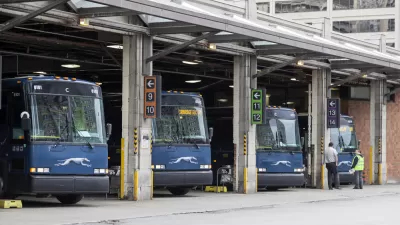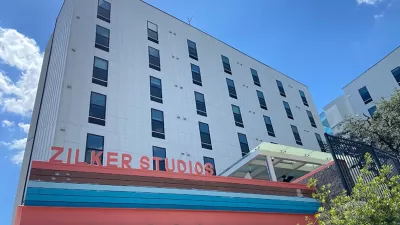A new report shows that low-carbon development policies can help to achieve numerous planning goals including job creation, improved safety and public health, social inclusion, and improved accessibility.

A new report, "The Economic and Social Benefits of Low-Carbon Cities: A Systematic Review of the Evidence," by University of Leeds researchers for the New Climate Economy's Coalition for Urban Transitions, examines the economic case for climate action through more resource-efficient urban planning. This comprehensive review shows that low-carbon measures can help to achieve a range of development priorities, such as job creation, improved safety and public health, social inclusion, and improved accessibility.
Co-benefits include:
- Congestion pricing has been found to reduce traffic, travel times, and congestion 10–30% (Section 2.2).
- Policies which promote liveable density have been shown to increase urban productivity by 3% for every doubling of urban density (Section 2.3.1).
- Public transport networks can reduce transport-related injuries by up to 80% (Section 2.1.5), create direct and indirect employment (Section 2.3.2), and improve public health (Sections 2.2.1, 2.2.2, and 2.1.4).
- Health benefits from dedicated cycle lanes vary from €0.30-1.20 per km (Section 2.1.4).
- Pedestrianisation produces health benefits several times larger than cost of investments (Section 2.1.4).
This evidence suggests that the benefits of these low-carbon measures extend far beyond emission reductions. The wider economic, social, and environmental impacts may be much more valuable than the financial returns associated with climate action. This bundle of measures could therefore provide a platform for more transformative change by building public enthusiasm for low-carbon urban development, as well as the institutional capacities, financing arrangements, and learning needed for more ambitious action.
FULL STORY: The Economic and Social Benefits of Low-Carbon Cities: A Systematic Review of the Evidence

Maui's Vacation Rental Debate Turns Ugly
Verbal attacks, misinformation campaigns and fistfights plague a high-stakes debate to convert thousands of vacation rentals into long-term housing.

Planetizen Federal Action Tracker
A weekly monitor of how Trump’s orders and actions are impacting planners and planning in America.

In Urban Planning, AI Prompting Could be the New Design Thinking
Creativity has long been key to great urban design. What if we see AI as our new creative partner?

Florida Seniors Face Rising Homelessness Risk
High housing costs are pushing more seniors, many of them on a fixed income, into homelessness.

Massachusetts Budget Helps Close MBTA Budget Gap
The budget signed by Gov. Maura Healey includes $470 million in MBTA funding for the next fiscal year.

Milwaukee Launches Vision Zero Plan
Seven years after the city signed its Complete Streets Policy, the city is doubling down on its efforts to eliminate traffic deaths.
Urban Design for Planners 1: Software Tools
This six-course series explores essential urban design concepts using open source software and equips planners with the tools they need to participate fully in the urban design process.
Planning for Universal Design
Learn the tools for implementing Universal Design in planning regulations.
Gallatin County Department of Planning & Community Development
Heyer Gruel & Associates PA
JM Goldson LLC
City of Camden Redevelopment Agency
City of Astoria
Transportation Research & Education Center (TREC) at Portland State University
Jefferson Parish Government
Camden Redevelopment Agency
City of Claremont




























